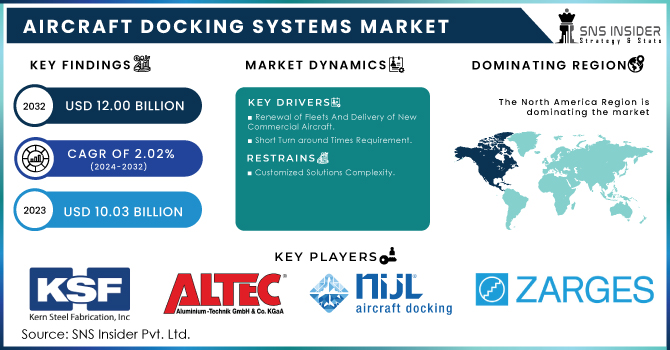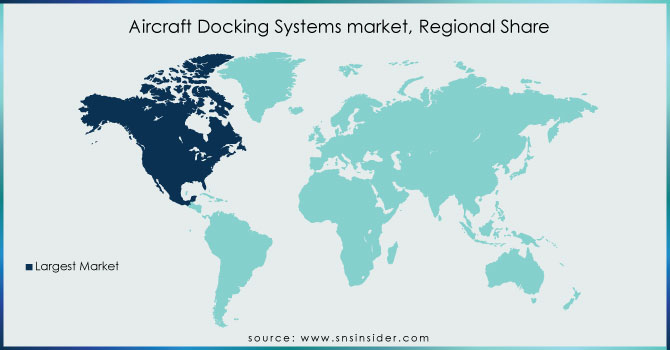Aircraft Docking Systems Market Report Scope & Overview:
The Aircraft Docking Systems Market size was valued at USD 10.03 Billion in 2023. It is expected to reach USD 12.00 Billion by 2032 and grow at a CAGR of 2.02% over the forecast period 2024-2032.
The Aircraft docking system is the most useful piece of equipment in the aircraft bay, with very high requirements for accuracy, dependability, and safety of aircraft parking. The Aircraft docking system delivers data that is used to correctly direct the taxing aircraft along the last stretch of the taxiway until it stops in the proper parking position. A variety of aircraft docking systems are available, including laser aircraft docking systems and visual aircraft docking systems.
With the increased need for new Aircraft, the demand for aircraft docking systems has increased significantly. A docking system is an essential component in the production and maintenance of an aeroplane. It simplifies aircraft manufacturing, maintenance, and painting operations by supplying work platforms to the necessary regions of the aircraft to do the task efficiently and swiftly.

To get more information on Aircraft Docking Systems Market - Request Free Sample Report
MARKET DYNAMICS
KEY DRIVERS
-
Renewal of Fleets And Delivery of New Commercial Aircraft.
-
Short Turn around Times Requirement
RESTRAINTS
-
Customized Solutions Complexity
CHALLENGES
-
Large expanses are required to build aeroplane docks.
-
The idea's implementation is expensive.
OPPORTUNITIES
-
Demand for Self-Propelled And Automated Units
IMPACT OF COVID-19
The COVID-19 epidemic has been growing at an alarming rate since its outbreak in 2019. With no way to prevent humanity, the virus was threatening the lives of people all over the world. Governments in various lands have closed roads in regional areas to control the spread of the virus. Travel, transportation, and communication were restricted during that time. By the time people understood the function and threat of the virus, our social, political, and economic lives were becoming increasingly noisy. The aviation system market was also downgraded during the epidemic. Slowly, there was even a greater need for new aircraft. The COVID-19 virus has been shown to undermine the growth of many industries, including the aviation industry, but is expected to grow in the coming years in light of the need for safety that includes aircraft.
The worldwide aircraft docking systems market has been segmented into commercial, military, and general aviation platforms. During the projected period, the commercial segment is expected to grow at a faster rate of 3.40 percent. All non-military aircraft, such as scheduled carriers, business jets, and other private aircraft, fall into this category. Although narrow-body aircraft have less capacity than wide-body aircraft, they are more numerous in civil aviation.
The global aircraft docking systems market has been classified into nose docks, complete/combination docks, engine docks, fuselage docks, wing docks, and tail docks based on type. The fuselage docks segment led the market and is predicted to grow significantly. These docks have specially manufactured modules designed to facilitate access to the fuselage. These are typically combination docks with nose and wing docks.
The worldwide Aircraft docking systems market has been segmented into rotary-wing and fixed-wing aircraft. Fixed-wing aircraft are predicted to have a larger market share than rotary-wing aircraft due to advantages such as endurance, vast area coverage, flight speed, and a higher passenger carrying capacity. As a result, commercial airlines and military organizations typically use these aircraft for long-distance travel. Furthermore, due to an increase in air passenger traffic, demand for fixed-wing aircraft is increasing globally. As a result, rising demand for fixed-wing aircraft is likely to fuel expansion in the global Aircraft docking systems market. The worldwide aircraft docking systems market has been divided into two segments based on operation: powered and non-powered. During the forecast period, the powered category is expected to have the highest CAGR. Powered Aircraft docking systems are height adjustable, and their movements and adjustments are controlled by electrical panels. The majority of powered docking systems are designed for aircraft nose, tail, engine, and wing. Powered docks can accommodate a wide variety of aircraft models. Furthermore, demand for automated and self-propelled docking systems has increased in recent years. The global aircraft docking systems market has been segmented by application into aircraft manufacturing, aircraft maintenance, repair, and overhaul (MRO), and aircraft painting. The segment of aircraft manufacturing is predicted to have a bigger market share. During manufacturing processes, aircraft docking systems shorten the time required to reach various regions of the aircraft. This helps to shorten the time necessary for aircraft production. Furthermore, as passenger traffic and defence spending have increased in recent years, so has the demand for new aircraft. As a result, demand for Aircraft docking systems is likely to rise over the review period.
KEY MARKET SEGMENTATION
By Platform
-
Fixed Wing
-
Rotary Wing
By Type
-
Nose Docks
-
Complete/Combination Docs
-
Engine Docs
-
Fuselage Docs
-
Wing Docs
-
Tail Docs
-
Others
By Platform
-
Military
-
Commercial
-
General Aviation
By Application
-
Aircraft Manufacturing
-
Aircraft Maintenance
-
Repair & overhaul (MRO)
-
Aircraft painting
By Operation
-
Powered
-
Non-Powered
REGIONAL ANALYSIS
North America lead the market in terms of valuation, and the regional market is predicted to rise throughout the projection period. This is due to the presence of major aircraft manufacturers and MRO service providers in the region, such as Boeing, AAR, and Delta Tech Ops. With a valuation, Europe was the second-largest market. During the review period, the European market is expected to grow at a faster rate. During the review period, Asia-Pacific is predicted to be the fastest-growing market for aircraft docking system services.

Need any customization research on Aircraft Docking Systems Market - Enquiry Now
REGIONAL COVERAGE:
-
North America
-
USA
-
Canada
-
Mexico
-
-
Europe
-
Germany
-
UK
-
France
-
Italy
-
Spain
-
The Netherlands
-
Rest of Europe
-
-
Asia-Pacific
-
Japan
-
south Korea
-
China
-
India
-
Australia
-
Rest of Asia-Pacific
-
-
The Middle East & Africa
-
Israel
-
UAE
-
South Africa
-
Rest of Middle East & Africa
-
-
Latin America
-
Brazil
-
Argentina
-
Rest of Latin America
-
KEY PLAYERS
The Major Players are Kern Steel Fabrication Inc., ALTEC Aluminium Technik GmbH, NIJL Aircraft Docking, ZARGES GmbH , Aircraft Support Industries, Reel, Turner & Co. Ltd, Sagarasia, JBT, Midland Access Solutions, Kawasaki Heavy Industries, and other players
| Report Attributes | Details |
|---|---|
| Market Size in 2023 | USD 10.03 Billion |
| Market Size by 2032 | USD 12.00 Billion |
| CAGR | CAGR of 2.02% From 2024 to 2032 |
| Base Year | 2023 |
| Forecast Period | 2024-2032 |
| Historical Data | 2020-2022 |
| Report Scope & Coverage | Market Size, Segments Analysis, Competitive Landscape, Regional Analysis, DROC & SWOT Analysis, Forecast Outlook |
| Key Segments | • By Platform (Fixed Wing, Rotary Wing) • By Type (Nose Docks, Complete/Combination Docs, Engine Docs, Fuselage Docs, Wing Docs, Tail Docs, Others) • By Platform (Military, Commercial, General Aviation) • By Application (Aircraft manufacturing, Aircraft maintenance, Repair & overhaul (MRO), Aircraft painting) • By Operation (Powered, Non-Powered) |
| Regional Analysis/Coverage | North America (USA, Canada, Mexico), Europe (Germany, UK, France, Italy, Spain, Netherlands, Rest of Europe), Asia-Pacific (Japan, South Korea, China, India, Australia, Rest of Asia-Pacific), The Middle East & Africa (Israel, UAE, South Africa, Rest of Middle East & Africa), Latin America (Brazil, Argentina, Rest of Latin America) |
| Company Profiles | Kern Steel Fabrication Inc., ALTEC Aluminium Technik GmbH, NIJL Aircraft Docking, ZARGES GmbH , Aircraft Support Industries, Reel, Turner & Co. Ltd, Sagarasia, JBT, Midland Access Solutions, Kawasaki Heavy Industries, and other players. |
| DRIVERS | • Renewal of Fleets And Delivery of New Commercial Aircraft. • Short Turn around Times Requirement |
| RESTRAINTS | • Customized Solutions Complexity |

